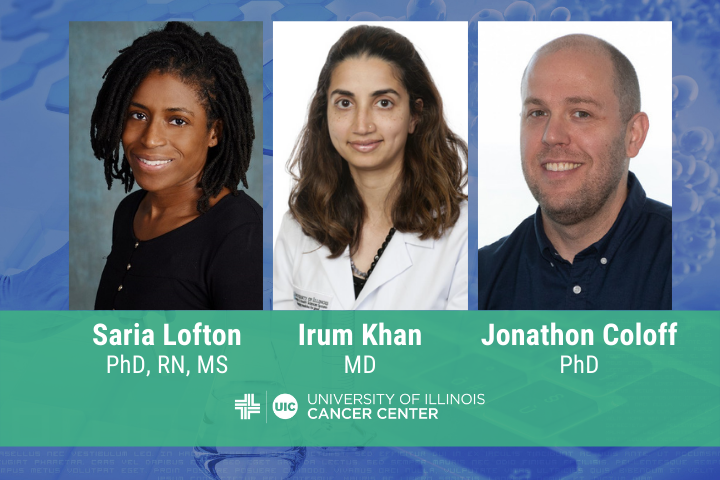
Three rising investigators are charged with deepening ties between the University of Illinois Cancer Center’s research programs and the groups they serve.
The Community Outreach and Engagement Office, led by Associate Director Yamilé Molina, PhD, is launching a program with designated liaisons from each of the Cancer Center’s three scientific programs – Cancer Biology, Translational Oncology and Cancer Prevention and Control.
The program is intended to create a robust partnership between scientists and stakeholders, reinforcing the Cancer Center’s community-informed model for research.
The research program liaisons are:
Cancer Prevention and Control – Saria Lofton, PhD, RN, MS, Assistant Professor, Population Health Nursing Science
Translational Oncology – Irum Khan, MD, Assistant Professor, Department of Medicine
Cancer Biology – Jonathan Coloff, PhD, Assistant Professor, Physiology and Biophysics
The research liaisons will function as active brokers who connect the interests of their research programs, the Community Outreach and Engagement (COE) Office and the 14-member Community Advisory Board, said Molina, who is also an associate professor in the UIC School of Public Health.
The liaisons meet monthly with Community Outreach and Engagement Office leaders to discuss topics including funding opportunities and research partnerships. Three meetings between the liaisons and the new 14-member Community Advisory Board will also be scheduled.
“This program intrinsically ties the community to the work conducted by the Cancer Center research programs. For instance, a liaison might ask the community for the best strategies to spread the word about a clinical trial that addresses unmet needs among patients in the area,” Molina said. “Or they might ask for a grant review from a patient advocate in the community to confirm the research planned is likely to elicit actionable information.
“The most respected research funders understand the value of these relationships and increasingly expect grant submissions to include community and patient advocate input.”
Cancer Center Director Jan Kitajewski, PhD, said this strong interaction with community engagement will shape perspectives for early-stage investigators, who in turn will train others in people-centric research.
“As a community-focused cancer center, we link our efforts directly to the needs of real people and their lived experiences. That means hearing directly from community members about what they need and responding with science that directly benefits them,” Kitajewski said.
